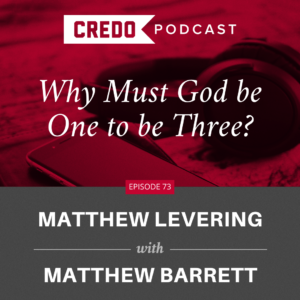Show Notes
This is a series of conversations between major theologians and Matthew Barrett on the doctrine of the Trinity.
 According to philosopher Ronald Nash, the doctrine of divine simplicity has a PR problem. However, contrary to the claims of its opponents, the belief that God is one is essential to biblical Christianity and classical theism. Quite simply (!) the doctrine of divine simplicity states that all that is in God is God and, to put it negatively, there is nothing in God that is not God. How, then, do Christians relate the doctrine of divine simplicity to the doctrine of the Trinity? How do Christians relate God’s “oneness” to His “threeness” without sacrificing either doctrine?
According to philosopher Ronald Nash, the doctrine of divine simplicity has a PR problem. However, contrary to the claims of its opponents, the belief that God is one is essential to biblical Christianity and classical theism. Quite simply (!) the doctrine of divine simplicity states that all that is in God is God and, to put it negatively, there is nothing in God that is not God. How, then, do Christians relate the doctrine of divine simplicity to the doctrine of the Trinity? How do Christians relate God’s “oneness” to His “threeness” without sacrificing either doctrine?
In this podcast Matthew Levering and Matthew Barrett answer these tough questions with a focus on chapter 5 of Barrett’s book, Simply Trinity: The Unmanipulated Father, Son, and Spirit (Baker, 2021). According to Levering and Barrett, divine simplicity not only protects Jesus’s identity as the one Lord but also provides the framework to understand God as Trinity.
Look for new conversations with notable theologians every week through Credo Magazine!
Matthew Levering holds the James N. and Mary D. Perry, Jr. Chair of Theology at Mundelein Seminary. He is the author or coauthor of over twenty books including The Theology of Augustine: An Introductory Guide to His Most Important Works, Did Jesus Rise from the Dead? Historical and Theological Reflections, Scripture and Metaphysics,Participatory Biblical Exegesis, andEngaging the Doctrine of Revelation.
Matthew Barrett is the author of Simply Trinity: The Unmanipulated Father, Son, and Holy Spirit (Baker). He is the founder and executive editor of Credo Magazine and host of the Credo podcast. He is associate professor of Christian theology at Midwestern Baptist Theological Seminary.
